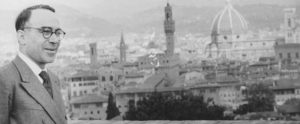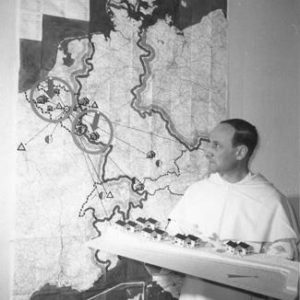World Peace, Urbanization and the Dominican Family
By Fr. Francis Belanger
A few months of sabbatical have afforded me the privilege to work at the Dominican Leadership Conference’s United Nations office in New York with Margaret Mayce, O.P. Recently with the encouragement of Margaret’s assistant Katherine Maloney, I attended a U.N. meeting on the topic “Sustaining Peace in an Urban World.” The topic of the presentations was the intersection between the disparate global issues of urbanization and peace-making. I admit to an initial difficulty grasping the concept, but the memory of two members of the Dominican family – Giorgio LaPira and Dominique Pire – and an entire branch of it – the active Sisters – came to mind as a help in framing the issue.
Before the talks even started, the topic put me in mind of the saintly Giorgio LaPira (1904-1977). A member of the Dominican Laity, he was the mayor of Florence for two stints in the 1950s and 1960s. Celibate, he lived for a time while mayor with the friars at the famous San Marco convent. He was a tireless crusader for the poor and, more to the point, used his status as mayor as a launching pad for engagement with global issues. He was an advocate for peace in the Middle East and an end to the nuclear arms race. In 1954 in Geneva he delivered a speech that posed the poignant question, “Do nations have the right to destroy cities?” Over a half-century ago, Giorgio saw the connection between the universal common good and healthy cities. Having been given the title “Servant of God” his cause for Beatification is now in Rome.
One of the speakers at the U.N. conference made an impressive presentation on the plight of displaced persons in Lebanon, a country where one-fourth of the people are refugees. I was reminded of Fr. Dominique Pire, the Belgian Dominican friar who won the Noble Peace Prize in 1958. Although his work would later go global, he was initially recognized for helping refugees from Eastern Europe after World War II. A kind of prophet of Vatican II, he inspired a continent-wide ecumenical coalition to help the “DPs” (displaced persons) in a way that guaranteed their dignity. “Help for self-help” was his simple motto and his organization, Heart Open to the World, established refugee centers called “European Villages.” More than camps, these were truly places to live, where the displaced could maintain a semblance of their culture while gradually being included in their new country.
Education is a means to integral human development. In that sense the many religious sisters, including Dominican sisters, who educated immigrants and their children in America’s cities were and are disciples of peace. It is truly a miracle to consider how the “huddled masses” who came to America’s shores in the nineteenth and twentieth centuries so often met with love, order and learning thanks to these dedicated religious. Instead of succumbing to the chaos of slum life, multitudes were, as I heard a bishop put it, catapulted into the middle class. Oftentimes the “American Dream” was thus leavened by faith.
At the U.N., Dominicans and others seek to bring faith to bear on the world’s problems and challenges. It’s good to know that others have gone before us, showing us that it is possible to be a light amidst the darkness of urban and global problems. As the Holy Father gives his blessing urbi et orbi this Christmas, may we all, wherever we work, be a blessing to the city and the world.



 Dominican Leadership Conference
Dominican Leadership Conference